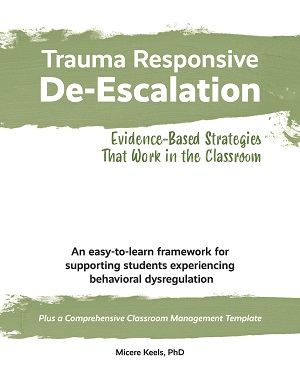Description
Externalizing behaviors in the classroom and their connection to trauma are at the top of most educators’ concerns. Children who have experienced trauma may express their distress through acting-out behaviors that can derail instruction and compromise classroom safety.
When the underlying cause of acting-out behaviors is trauma, what appears to be intentional disruption of the learning environment may be due to the student feeling a lack of emotional, psychological, or physical safety. Punitive discipline will only make the student feel more anxious and unsafe, intensifying their acting-out behaviors.
Learning to utilize trauma responsive de-escalation practices enables educators to understand the underlying causes of acting-out behaviors and consistently provide developmentally supportive responses.
Trauma Responsive De-Escalation contains 15 easy-to-follow de-escalation lessons coupled with a comprehensive classroom management planning workbook. Whether you are new to the profession or a veteran educator, this guide will help you strengthen your classroom management practices.
About the Author
Dr. Micere Keels is an Associate Professor at the University of Chicago, and the Founding Director of the Trauma Responsive Educational Practices Project (TREP Project). For over two decades, she has worked to integrate mental health promotion interventions into educational systems and structures, from early childhood centers to high schools. The TREP Project works to develop the individual and organizational capacity of educators and schools serving children growing up in neighborhoods that have high levels of toxic stress, such as violent crime, concentrated poverty, concentrated foster care involvement, and housing instability. Through the TREP Project, she has supported the professional development of over 200,000 educators through school district partnerships in Delaware, Illinois, New York, Ohio, and Rhode Island, and through work with many individual schools across the U.S.
Micere Keels resides in Chicago, Illinois.
About the Contributor
Marcela Cartagena is a journalist and communication specialist with 22 years of experience in newspapers, technical editing, and public relations in English and Spanish. She was editor and writer for La Raza newspaper in Chicago, and previously copy editor for The Clarion-Ledger in Jackson, Mississippi. She was born and raised in Santiago, Chile.






